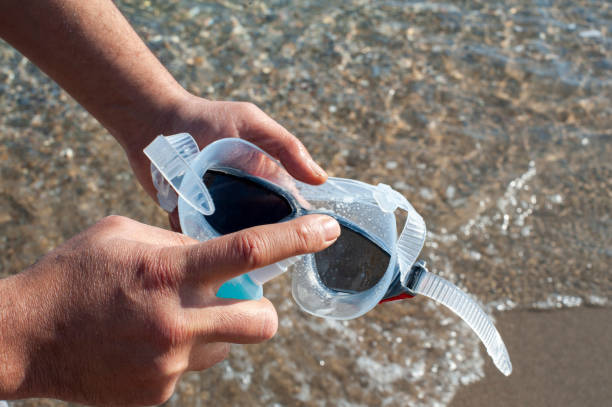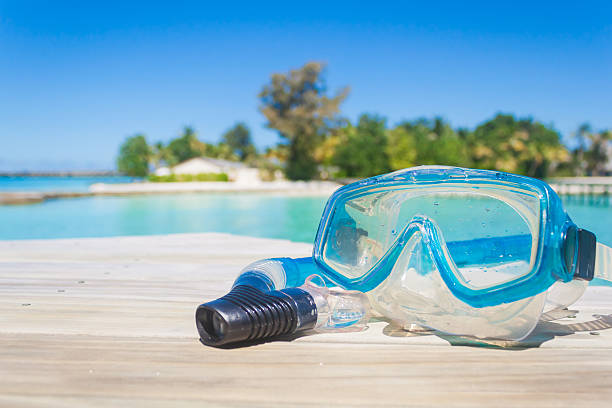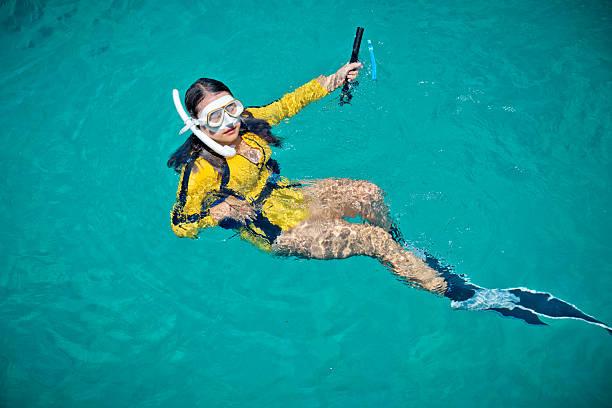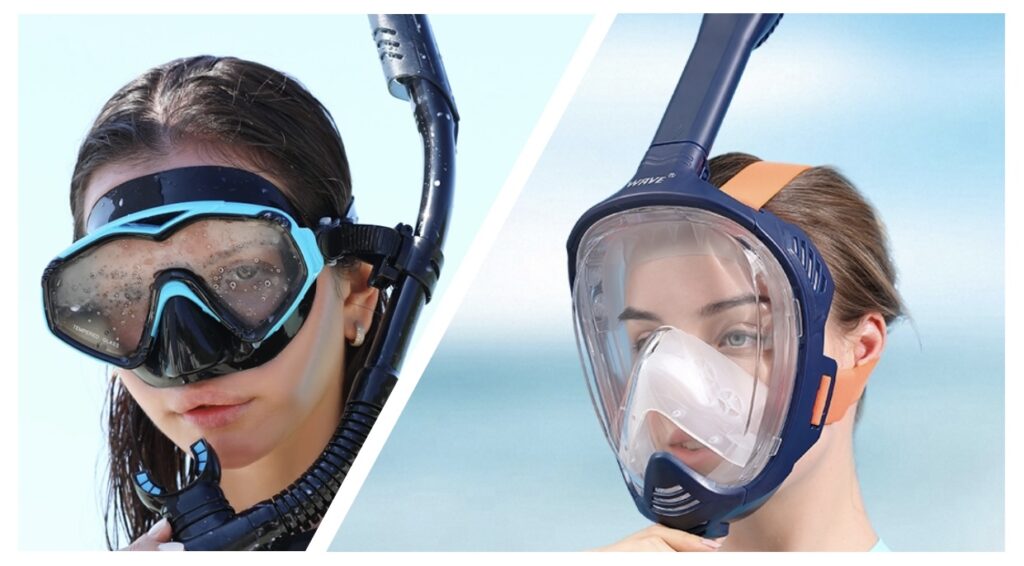
스노클링은 생동감 넘치는 수중 세계를 탐험할 수 있는 인기 있는 활동입니다. 이 활동의 핵심은 적절한 장비를 선택하는 것입니다. 스노클 마스크이는 전반적인 경험에 큰 영향을 미칩니다. 이 글에서는 풀페이스 스노클 마스크와 기존 스노클 마스크에 대한 논쟁을 심도 있게 살펴보고, 각 마스크의 장단점을 분석하여 현명한 결정을 내리는 데 도움을 드리겠습니다.
풀페이스 스노클링 마스크란?
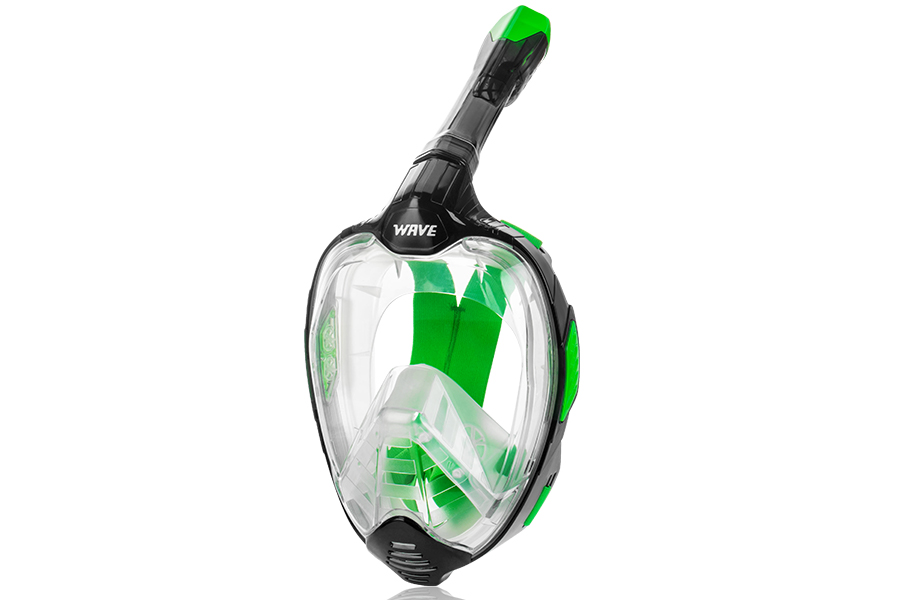
에이 풀페이스 스노클 마스크, 또한 ~라고도 함 풀페이스 다이빙 마스크는 마스크와 스노클을 하나의 장치로 결합한 혁신적인 장비입니다. 얼굴 전체를 덮다더 넓은 시야와 자연스러운 호흡 경험을 제공합니다. 이 마스크는 스노클러, 특히 기존 마스크가 두려울 수 있는 초보자에게 편안함과 편의성을 제공하는 것을 목표로 합니다.
풀페이스 스노클링 마스크는 어떻게 작동하나요?
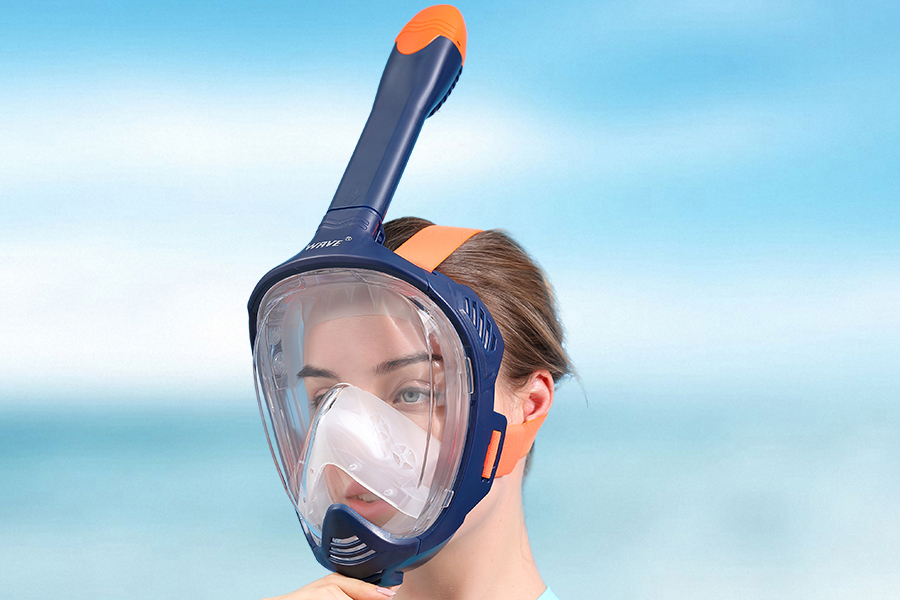
마스크와 호흡 튜브를 하나의 장치로 통합했습니다. 호흡은 코와 입을 통해 자연스럽게 이루어지며, 마스크가 얼굴 전체를 감싸 수중 파노라마 뷰를 제공합니다.
풀페이스 스노클 마스크의 장단점
풀페이스 스노클링 마스크를 사용하기 전에, 해당 마스크의 장단점을 알아보고, 어떤 옵션이 수중 모험에 가장 적합한지 알아보세요.
장점
- 향상된 호흡 경험
- 초보자를 위한 사용 편의성 향상
- 안개 및 누출 문제 감소
향상된 호흡 경험: 기존 마스크와 달리 풀페이스 스노클 마스크는 코와 입으로 모두 숨을 쉴 수 있도록 해줍니다. 이 기능은 스노클 튜브로 숨을 쉴 때의 불편함을 없애고 더욱 자연스러운 호흡 리듬을 만들어줍니다.
초보자도 쉽게 사용할 수 있습니다. 풀페이스 마스크는 초보자에게 적합합니다. 물속에서 안정감과 자신감을 느낄 수 있기 때문입니다. 시야가 넓어 폐소공포증을 줄이는 데에도 도움이 됩니다.
안개 현상과 누출 문제 감소: 풀페이스 스노클 마스크의 첨단 환기 시스템은 김 서림을 최소화하여 수중에서 깨끗한 시야를 보장합니다. 또한, 방수 씰은 마스크 내부로 물이 유입되는 것을 방지하여 누수 문제를 해결합니다.
단점
- 잠재적인 CO2 축적
- 압력 평형의 어려움
- 제한된 사용자 정의 옵션
잠재적인 CO2 축적: 전면 마스크는 날숨 시 이산화탄소(CO2)를 가두는 폐쇄된 시스템을 형성하여 제대로 관리하지 않으면 호흡 곤란을 초래할 수 있습니다. CO2가 쌓이는 것을 방지하기 위해 제조업체의 지침을 따르고 자주 강하게 숨을 내쉬는 것이 중요합니다.
압력 평형의 어려움: 깊은 수심에서 스노클링을 할 때는 압력 평형이 매우 중요합니다. 스노클링용 풀페이스 마스크는 전용 코 포켓이 없어 압력 평형에 어려움을 겪을 수 있습니다. 깊은 수심에서 다이빙할 때는 압력 평형 기술을 연습하거나 일반 마스크를 선택하는 것이 중요합니다.
제한된 사용자 정의 옵션: 스노클링용 풀페이스 마스크는 다양한 얼굴형과 크기에 맞게 설계되었지만, 기존 마스크만큼 맞춤 설정이 가능하지 않을 수 있습니다. 얼굴 특징이 독특한 사람들은 편안한 착용감을 찾기 어려울 수 있습니다.
전통적인 스노클링 마스크란 무엇인가요?
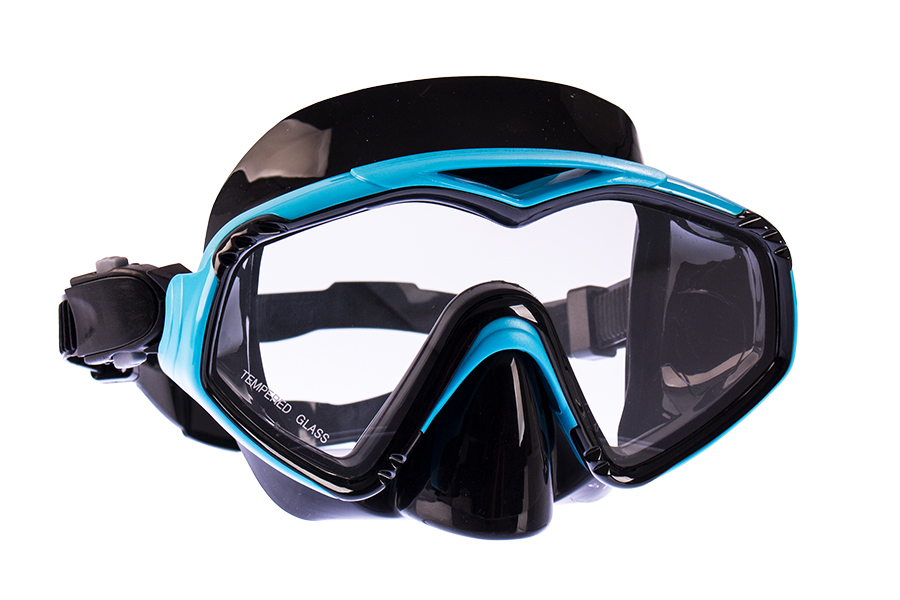
전통적인 마스크와 스노클 세트라고도 합니다. 하프 마스크, 다이빙 마스크 또는 스쿠버 마스크, 스노클 마스크로 구성되어 있습니다. 스노클 튜브, 그리고 아마도 한 쌍 스노클링 핀. 이 마스크들은 눈, 코, 입만 가리다얼굴의 나머지 부분은 그대로 노출됩니다. 전통적인 마스크는 수년간 사용되어 왔으며 신뢰성과 다용도로 잘 알려져 있습니다.
전통적인 스노클링 마스크는 어떻게 작동하나요?
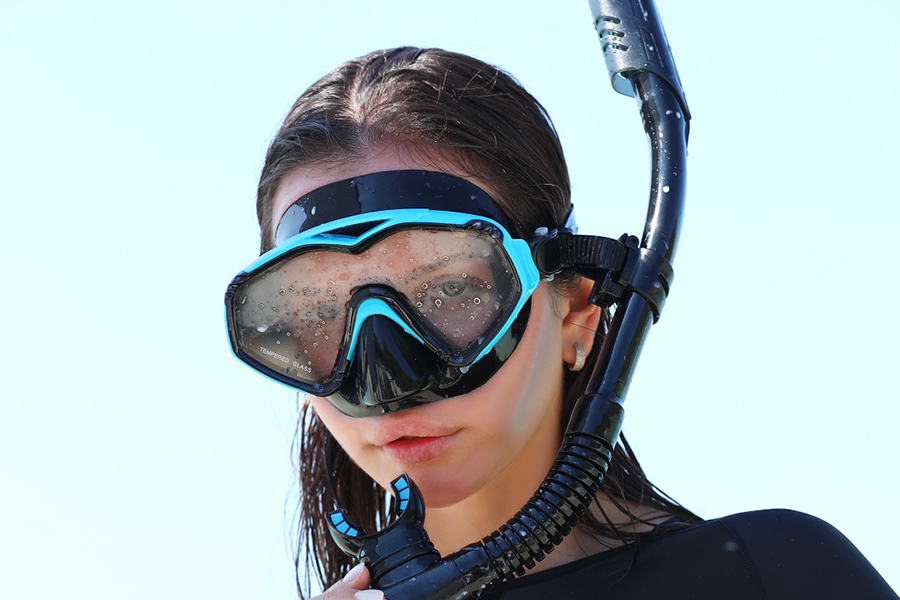
이 마스크는 눈과 코를 덮는 마스크와 수면 위로 뻗어 있는 호흡관으로 구성되어 있습니다. 사용자는 이 호흡관을 통해 입으로 숨을 쉬고, 마스크는 수중 시야를 제공합니다.
전통 스노클링 마스크의 장단점
전통적인 스노클링 마스크를 사용하기 전에, 해당 마스크의 장단점을 알아보고, 어떤 옵션이 수중 모험에 가장 적합한지 알아보세요.
장점
- 개인의 선호도에 맞춰 조절 가능한 핏
- 마스크에서 물을 쉽게 제거할 수 있습니다
- 필요한 경우 부품을 교체할 수 있는 기능
개인의 선호도에 맞춰 조절 가능한 핏: 전통 스노클링 마스크 조절 가능한 스트랩이 함께 제공되어 개인 취향에 맞게 착용할 수 있습니다. 덕분에 스노클링 중 편안함을 보장하고 물 유입을 최소화할 수 있습니다.
마스크에서 물을 쉽게 제거할 수 있습니다. 전통적인 마스크를 사용하면 스노클러가 코로 강하게 숨을 내쉬어 마스크에서 물을 쉽게 제거할 수 있습니다.
필요한 경우 부품을 교체할 수 있는 능력: 기존 스노클링 마스크 세트의 구성 요소가 손상되거나 마모된 경우, 완전히 새로운 마스크를 구매하지 않고도 해당 부품을 쉽게 교체할 수 있습니다.
단점
- 호흡 기법을 위한 곡선을 배우세요
- 잠재적인 누출 및 안개 문제
- 풀페이스 마스크에 비해 시야가 좁음
호흡 기법에 대한 학습 곡선: 초보 스노클러는 일반 마스크로는 올바른 호흡법을 익히는 데 어려움을 겪을 수 있습니다. 입으로만 호흡하는 것은 처음에는 부자연스럽게 느껴질 수 있지만, 연습하면 자연스럽게 익숙해집니다.
잠재적인 누출 및 안개 문제: 기존 마스크는 때때로 누수나 김 서림 현상이 발생할 수 있으며, 이는 시야 확보 및 전반적인 스노클링 경험을 저해할 수 있습니다. 정기적인 관리와 적절한 착용은 이러한 문제를 최소화하는 데 도움이 됩니다.
풀페이스 마스크에 비해 시야가 좁음: 기존 마스크는 시야가 좁아 주변 시야가 제한적입니다. 이는 수중 풍경과 해양 생물을 탐험할 때 단점이 될 수 있습니다.
풀페이스 스노클 마스크와 일반 스노클 마스크의 차이점
풀페이스 스노클링 마스크와 일반 스노클링 마스크 중 어떤 것을 선택하느냐에 따라 스노클링 경험이 크게 달라질 수 있습니다. 일반 마스크는 클래식한 디자인을 제공하는 반면, 풀페이스 마스크는 더욱 편안하고 몰입감 있는 경험을 제공하며, 차별화된 고유한 기능과 장점을 제공합니다. 하지만 두 마스크의 차이점은 단순히 외관 디자인만이 아닙니다. 더 깊은 부분에 대해서도 자세히 알아보겠습니다.
호흡 메커니즘: 공기 흐름 측면에서의 차이점
풀페이스 스노클링 마스크는 코와 입으로 모두 호흡할 수 있어 자연스러운 호흡과 유사해 편리함을 제공합니다.
이와 대조적으로, 전통적인 스노클링 마스크는 입으로만 호흡해야 하므로 때로는 제한적일 수 있습니다.
시야: 가시성과 주변 시야 비교
스노클링 풀페이스 마스크는 더 넓은 시야를 제공하여 얼굴 전체를 덮으므로 스노클러가 수중 세계의 탁 트인 전망을 즐길 수 있습니다.
기존 마스크는 시야가 좁아 주변 시야가 제한됩니다.
편안함과 착용감: 두 가지 마스크 유형의 인체공학적 측면 검토
풀페이스 마스크는 일반적으로 초보자나 민감한 얼굴 피부를 가진 사람들에게 더 편안합니다. 편안한 착용감을 제공하고 마우스피스를 물 필요가 없습니다.
기존 마스크는 사용자 맞춤형으로 조절할 수 있지만, 턱에 가해지는 압력으로 인해 장시간 착용 시 편안하지 않을 수 있습니다.
풀페이스 스노클 마스크와 일반 스노클 마스크 비교표
| 유형 | 풀페이스 스노클 마스크 | 전통 스노클링 마스크 |
| 호흡 메커니즘 | 코와 입으로 호흡이 가능합니다. | 입으로만 호흡해야 합니다 |
| 시야 | 얼굴 전체를 덮는 더 넓은 시야를 제공합니다. | 더 작은 시야 영역과 제한된 주변 시야를 제공합니다. |
| 편안함과 핏 | 일반적으로 더 편안하고 꼭 맞는 핏으로 물기 위한 마우스피스가 없습니다. | 조절 가능한 핏은 장시간 사용 시 불편함을 유발할 수 있습니다. |
| CO2 축적 | CO2 축적 가능성 | CO2 축적 없음 |
| 압력 평형 | 전용 코 주머니가 없어 압력 평형에 어려움을 겪을 수 있습니다. | 코를 꼬집고 가볍게 불어서 더 쉽게 압력 평형을 맞출 수 있습니다. |
| 사용자 정의 옵션 | 독특한 얼굴 특징을 가진 개인을 위한 제한된 사용자 정의 옵션 | 조절 가능한 스트랩 및 교체 부품 옵션 |
| 초보자를 위한 사용 편의성 | 초보자에게 적합하며 안정감과 자신감을 제공합니다. | 호흡 기법에 익숙해지려면 약간의 연습이 필요할 수 있습니다. |
| 물 청소 | 고급 환기 시스템은 안개 발생을 줄이고, 방수 밀봉으로 누출을 방지합니다. | 누출 및 안개 현상이 발생할 수 있으며 최적의 성능을 위해서는 정기적인 유지 관리가 필요합니다. |
| 스노클링 조건 | 잔잔하고 얕은 물에 적합합니다. | 더 깊은 다이빙을 포함한 다양한 조건에 적합 |
| 추천 대상 | 초보자, 민감한 얼굴 피부를 가진 개인 | 전통적인 마스크를 선호하고 입으로만 호흡하는 것에 편안함을 느끼는 분들 |
풀페이스 마스크와 일반 스노클링 마스크 중 어느 것이 더 낫나요?
풀페이스 스노클링 마스크와 기존 스노클링 마스크 중 어느 것이 더 나은지는 주관적이며 다양한 요인에 따라 달라집니다.
경험 수준: 풀페이스 스노클링 마스크는 편안함과 사용 편의성을 제공하여 초보자에게 이상적입니다. 일반 마스크는 입으로만 숨쉬는 것에 익숙한 숙련된 스노클러에게 더 적합합니다.
편안함 선호도: 풀페이스 마스크는 더욱 편안하고 꼭 맞는 착용감을 제공하는 반면, 기존 마스크는 개인에게 맞게 조절할 수 있습니다.
스노클링 목표: 풀페이스 마스크는 잔잔하고 얕은 바닷물에 적합한 반면, 전통적인 마스크는 더 다재다능하고 깊은 바닷속을 포함한 다양한 환경에 적합합니다.
전반적으로, 스노클링 풀페이스 마스크는 초보자와 얼굴 피부가 민감한 사람에게 적합한 반면, 전통적인 스노클링 마스크나 일반 스노클링 마스크는 입으로만 호흡하는 것에 익숙한 사람에게 적합합니다.
결론
만족스럽고 즐거운 스노클링 경험을 위해서는 적절한 스노클링 마스크를 선택하는 것이 매우 중요합니다. 풀페이스 스노클링 마스크와 일반 스노클링 마스크의 차이점을 살펴보고 장단점을 비교해 보았습니다. 궁극적으로 선택은 개인의 취향, 편안함, 그리고 스노클링 환경에 따라 결정됩니다. 시간을 내어 자신의 필요를 파악하고 제공된 지침을 따라 현명한 결정을 내리시기 바랍니다. 스노클링에 대해 더 자세히 알아보려면 다음 자료도 참고하시기 바랍니다. 스노클링에 대해 알아야 할 모든 것.
스노클 마스크에 대한 FAQ
- 전체는 어떻게 되나요?–페이스 스노클 마스크가 효과가 있나요?
풀페이스 스노클 마스크는 얼굴 전체를 덮어 시야가 넓어지고 코와 입으로 숨을 쉴 수 있습니다. 내쉬는 공기를 위한 별도의 챔버를 사용하며, 김 서림을 최소화하고 적절한 공기 흐름을 보장하는 첨단 환기 시스템을 갖추고 있습니다.
- 전체를 측정하는 방법–페이스 스노클 마스크?
풀페이스 스노클링 마스크의 적절한 크기를 결정하려면 코등에서 턱 아랫부분까지의 거리를 측정하세요.
- 어떤 크기의 스노클링 마스크가 필요한가요?
스노클 마스크 크기는 개인 얼굴 크기에 따라 다릅니다. 대부분의 제조업체는 얼굴 치수와 마스크 크기를 비교한 사이즈표를 제공합니다. 적절한 착용감과 최적의 성능을 보장하려면 이 지침을 따르는 것이 중요합니다.
- 가득 찼습니다–페이스 스노클링 마스크는 안전한가요?
풀페이스 스노클 마스크는 제조사 지침을 따라 올바르게 사용하면 안전할 수 있습니다. 이산화탄소(CO2) 축적 가능성을 인지하고 올바른 호흡법을 연습하는 것이 중요합니다. 스노클러는 자신의 한계를 인지하고 최적의 안전을 위해 마스크를 정기적으로 점검하고 관리해야 합니다.
- 스노클 마스크로 수중에서 호흡하는 방법은?
스노클 마스크가 제대로 맞고 밀착되도록 착용하여 수중에서 호흡하세요. 스노클 튜브를 물 위로 내밀고 턱을 편안하게 한 후 입으로 천천히 숨을 쉬세요. 스노클에 묻은 물을 제거하기 위해 부드럽게 숨을 내쉬세요. 휴식을 취하고 올바른 호흡법을 연습하세요.
